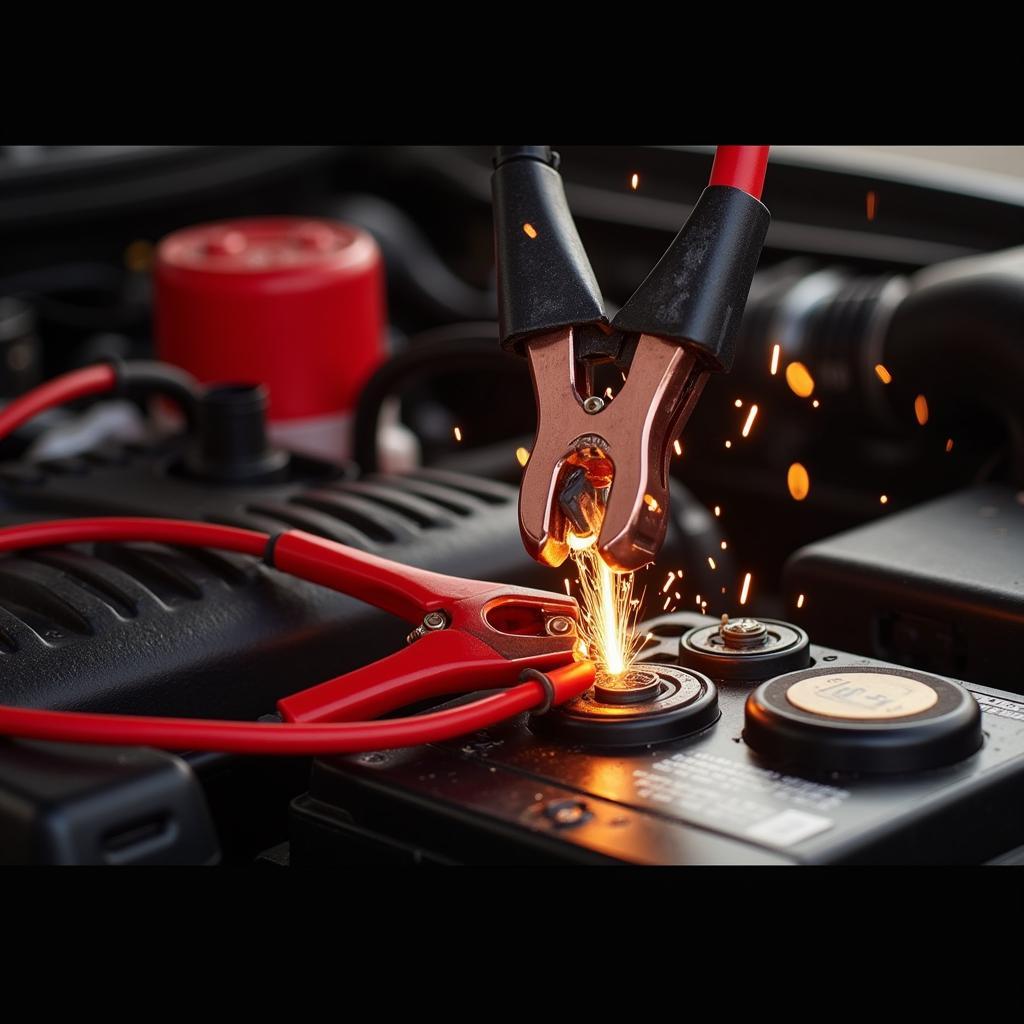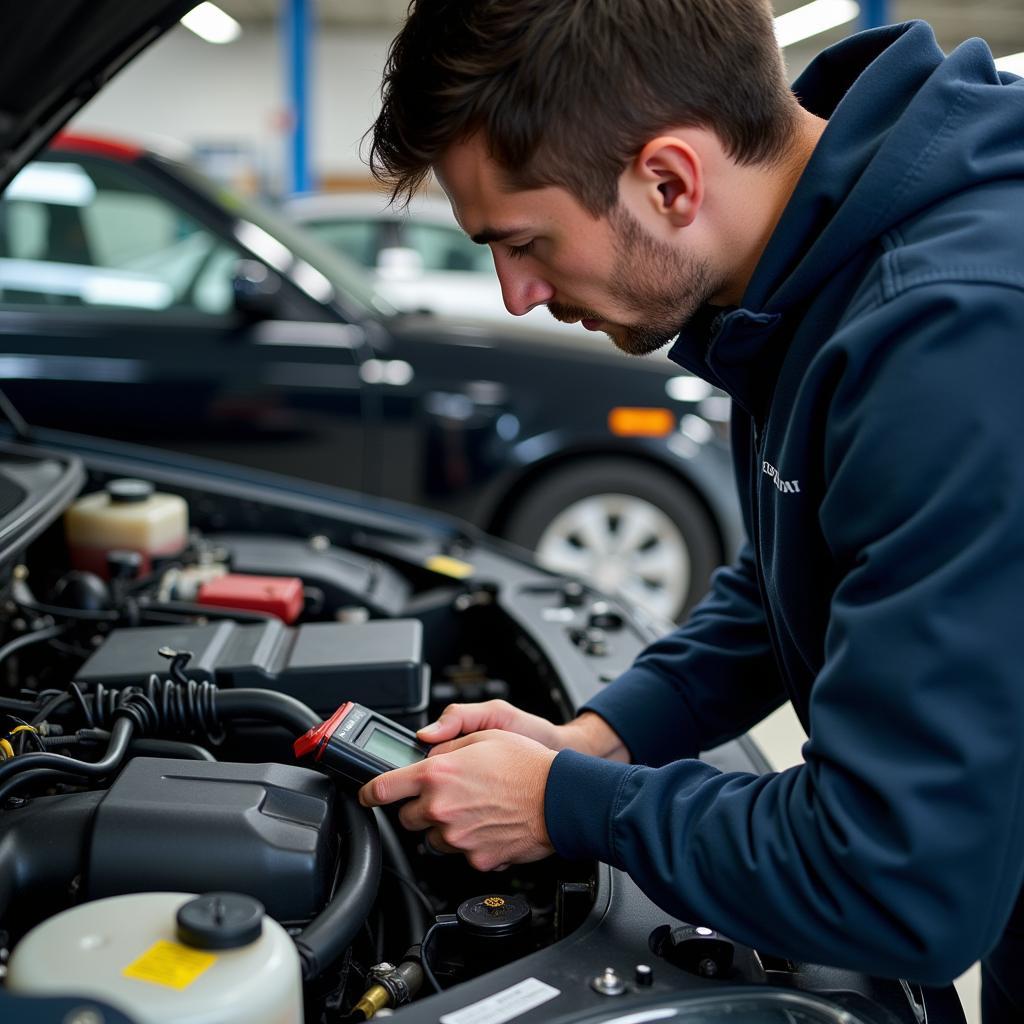Is your car refusing to start? It can be incredibly frustrating when you turn the key and are met with silence or a clicking sound. The problem often boils down to either the starter or the battery, but figuring out which one is the culprit can be tricky. This guide will walk you through how to differentiate between starter issues vs battery problems so you can get back on the road.
 Car Battery Jump Start
Car Battery Jump Start
Understanding the Starter’s Role
The starter is a powerful electric motor that cranks your engine to life. When you turn the key, the starter engages the flywheel, which rotates the engine’s internal components and initiates the combustion process. A malfunctioning starter can prevent the engine from turning over at all.
Common Signs of a Bad Starter
- Clicking sound when you turn the key: This is a classic sign of a failing starter solenoid, a small component within the starter that engages the motor.
- Grinding noise: A grinding sound indicates that the starter gear is not meshing correctly with the flywheel.
- Intermittent starting: Sometimes the car starts fine, and other times it doesn’t, suggesting a loose connection or a worn-out starter component.
- The engine doesn’t crank at all: If you turn the key and nothing happens, it could be a completely dead starter.
Recognizing Battery Problems
A weak or dead battery can also prevent your car from starting. The battery provides the electrical power needed to operate the starter, as well as other electrical systems in your vehicle.
Telltale Signs of a Dying Battery
- Dim headlights or interior lights: A weak battery struggles to power the electrical components.
- Slow cranking: The engine turns over slowly and laboriously.
- Electrical issues: Problems with the radio, power windows, or other electrical systems can indicate a battery problem.
- The car starts fine after a jump start: If the car starts with a jump but dies again soon after, the battery is likely not holding a charge.
- Swollen battery case: A physically deformed battery case is a clear sign of a serious problem and requires immediate replacement.
How to Reset AdBlue on Mercedes: A Common Electrical Issue
Sometimes, electrical problems can be caused by specific systems, like AdBlue. Learn how to reset adblue on mercedes to troubleshoot this issue.
Testing and Diagnosing
How do you know for sure whether it’s the starter or the battery? There are a few simple tests you can perform.
Testing the Battery
A multimeter is a handy tool for checking battery voltage. A fully charged battery should read around 12.6 volts. If the reading is significantly lower, the battery is likely weak. You can also get the mercedes adblue reset module to help with adblue problems.
Testing the Starter
While testing the starter can be more complex, a simple test involves tapping on the starter motor with a hammer while someone tries to start the car. If the car starts, it suggests a problem with the starter solenoid. For adblue concerns, explore the launch adblue reset options.
 Car Mechanic Checking Engine
Car Mechanic Checking Engine
Seeking Professional Help
While some troubleshooting can be done at home, it’s often best to seek professional help for starter or battery issues, especially if you’re unfamiliar with car repair. A qualified mechanic can accurately diagnose the problem and perform the necessary repairs. Considering an scr adblue reset could also be helpful in some situations.
Conclusion
Distinguishing between starter issues and battery problems can save you time and money. By understanding the signs and performing simple tests, you can narrow down the problem and take the appropriate steps to get your car started again. If you own a Sprinter, you might find the information on a 2019 mercedes sprinter adblue reset useful.
FAQ
- Can a bad starter drain the battery? Yes, a faulty starter can draw excessive current and drain the battery.
- How long does a car battery typically last? Car batteries usually last between 3 and 5 years.
- Can I jump start a car with a completely dead battery? You can attempt a jump start, but a completely dead battery may not hold a charge.
- What causes a starter to fail? Common causes include wear and tear, electrical shorts, and corrosion.
- How much does it cost to replace a starter? The cost varies depending on the make and model of the car, but it typically ranges from a few hundred to over a thousand dollars.
- How can I prevent battery problems? Regularly cleaning the battery terminals and ensuring the charging system is working correctly can help prevent battery problems.
- Can I replace a car battery myself? Yes, it’s a relatively simple task for most car owners, but it’s always a good idea to consult your car’s owner’s manual for specific instructions.

